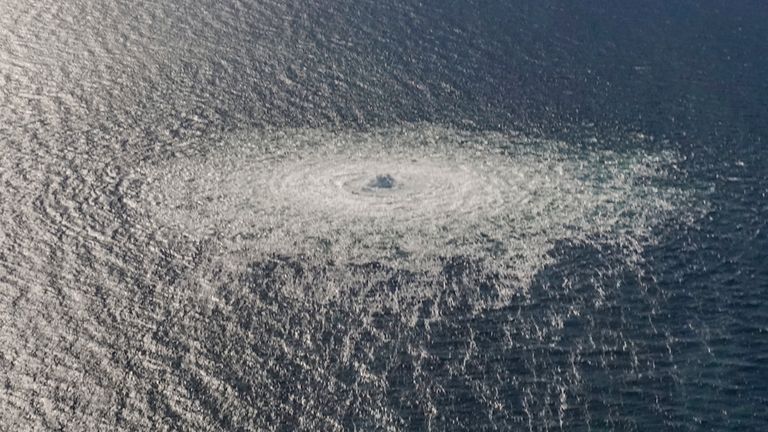A fourth leak has been reported on the Nord Stream gas pipelines.
Swedish coastguard told the newspaper Svenska Dagbladet it found the leak on Nord Stream 2 earlier this week.
It comes after three other leaks were reported on the pipelines - which run from Russia to Germany - with sabotage suspected.
"Two of these four are in Sweden's exclusive economic zone," coastguard spokesperson Jenny Larsson told the paper.
The other two are in Denmark's zone.
A British defence source told Sky News they were likely premeditated attacks using underwater explosives.
They said the mines could have been lowered on a long line, dropped over a boat or placed next to the pipelines with an underwater drone.
The European Union also believes the leaks are a result of sabotage.
Russia has said accusations it is responsible are "predictable" and "stupid".
Neither of the lines were in use at the time of the suspected explosions but they were still filled with gas that has been spewing into the sea.
Nord Stream 2 runs from Russia to Germany and had been due to carry gas to Europe until Russia invaded Ukraine and Germany refused a licence.
The first leak was detected on Monday morning about 14 miles (23km) southeast of Denmark's Bornholm Island.
On Tuesday, two more leaks were reported on the parallel Nord Stream 1 line, and today the Swedish coastguard revealed there were in fact four leaks.
Sweden's national seismology centre said "powerful subsea blasts" were recorded in the area the leaks occurred.
Bjorn Lund, a seismologist with Uppsala University, told broadcaster SVT: "There is no doubt that these were explosions."
In response, Norway has said its military will be more visible at its own oil and gas installations.
Read more:
'Sabotage': What we know about the Nord Stream leaks and who was behind them
Danish foreign minister Jeppe Kofod said the damage to the pipelines was "intentional, not an accident" and that it should concern the whole of Europe.
He told Sky News: "This is unprecedented - we haven't seen that kind of attack or sabotage on critical European energy infrastructure.
"We do not take this very easy - it's something we are working closely on with allies in the EU and NATO."
Mr Kofod stressed it was important to allow investigations to take place before apportioning blame.
Experts expect teams with underwater drones will be sent to investigate, but say it could take a week or so before it's calm enough to do so.
Sky correspondent Alex Rossi said there are still some doubts about whether Russia would really resort to damaging the pipelines through which it sells its gas.
"Although you can see a benefit for the Russians in the sense that it makes energy prices go up, it creates political instability in European counties that are supporting Ukraine, it also is a bit of an own goal because they own the pipeline.
"Vladimir Putin could also just turn off the taps on and off. He doesn't actually need to blow up the infrastructure."
https://news.google.com/__i/rss/rd/articles/CBMiWGh0dHBzOi8vbmV3cy5za3kuY29tL3N0b3J5L2ZvdXJ0aC1sZWFrLXJlcG9ydGVkbHktZm91bmQtb24tbm9yZC1zdHJlYW0tcGlwZWxpbmUtMTI3MDcyODDSAQA?oc=5
2022-09-29 06:56:15Z
1576406631



Tidak ada komentar:
Posting Komentar